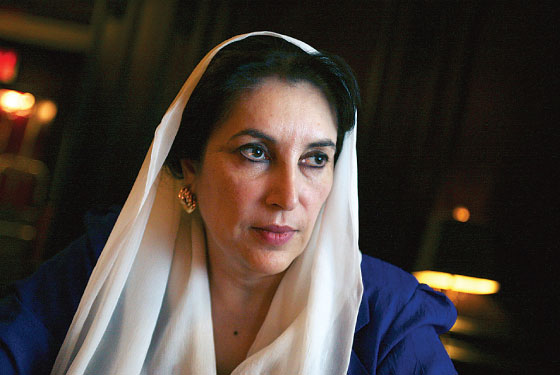
From the October 1, 2007 issue of New York Magazine.
Benazir Bhutto, the former prime minister of Pakistan who has lived in self-imposed exile for eight years, has vowed to return to her country next month to lead her Pakistan Peoples Party in elections. If able to serve a third term as prime minister, she might be a different kind of leader: In August, she told the Council on Foreign Relations that she regretted not being more “nurturing” while in power. “The people wanted me to be there as a woman leader,” she said. “I wish I had focused more on that than on the more militaristic notions.” It’s a dilemma familiar to a certain other woman running for chief executive. Bhutto spoke to Jennifer Senior.
Are there criticisms of Hillary you sometimes hear that you know are code for something else?
One thing people often say to me is that Bill Clinton is a very warm leader and that Hillary is much colder. But I think that women leaders tend to be a little bit withdrawn, to protect themselves from unkind comments. When a male leader is warm, it’s not misinterpreted. Whereas if a female leader is warm, it can have certain connotations. So a female leader has to be more restrained, in a sense.
When you were prime minister, were you scrutinized, as Hillary so often is, for trivial things, like the fashion choices you made?
Yes. I once had a male opposition leader get up in the assembly and say, “Oh, these white veils she wears, and how she brings them all the way from France!” Which was simply not true. I used to buy them in Pakistan. And then I looked at his shoes. He had bought Bally shoes! I couldn’t believe the hypocrisy of it. He took it for granted that no one would scrutinize him!
Did you say anything?
I didn’t. I didn’t want to be that kind of leader.
Did you also have a hard time earning the trust of other women, at least at first?
I had a lot of support among ordinary women. But women in leadership positions could sometimes be competitive. Those who’d achieved a lot could be my sharpest critics.
Did being a woman influence your leadership in a more subtle way?
I was able to put iodine in salt. And I was able to do that because I shopped for salt.
Why do you think that the U.S. seems to have a harder time with women at the highest level of power than other countries?
In a country like Pakistan or India, when a charismatic leader dies, people are not sure that the traditions he symbolized will continue—there’s a lot of illiteracy and there isn’t the same access to information. So they tend to transfer allegiance from a male leader to a female descendant, in the hope that his policies will be continued. But in Westernized societies, it’s a little different, because people have greater education and greater access to information—they don’t have the same need to be sure of the message of the leader.
Any advice for Bill on the campaign trail?
All I can tell him is that either way, you won’t win. Not if you disappear and not if you’re there campaigning. He’ll have to go by his instincts.
Have good intel? Send tips to intel@nymag.com.